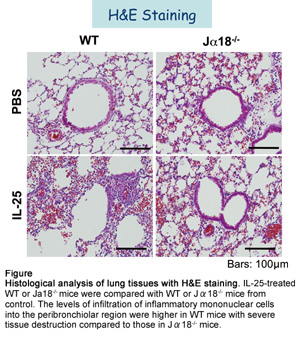When the authors investigated the expression of IL-17RB, a receptor for IL-25, they found that IL-17RB was selectively expressed by a fraction of NKT cells. This differential expression of IL-17RB led to an investigation of the phenotypic and functional characteristics of IL-17RB+ NKT cells. When the response of IL-17RB+ NKT cells to IL-25 was analyzed in vitro, the cells were found to produce Th2 cytokines and chemokines known to be associated with AHR. In addition, the IL-17RB+ NKT cells were found to be abundant in the lungs of Th2-prone mice.
Given these intriguing observations, the authors used a genetic approach to directly investigate the contribution of IL-17RB+ NKT cells to IL-25-triggerd AHR. Normal mice treated with IL-25 and immunized developed AHR; they had increased lung resistance, infiltration of inflammatory cells, abundant mucus-producing cells, and inflammatory cytokine production. Similarly treated NKT-deficient mice, by contrast, had no evidence of AHR. Furthermore, depletion of IL-17RB+ NKT cells by IL-17RB antibodies suppressed the development of AHR. These findings strongly suggest that IL-25 directly acts on NKT cells to induce AHR.
Allergy has become an increasing health and economic burden in industrial countries. In Japan, an estimated 30% of the population suffers from allergies such as pollinosis, asthma, or atopic diseases. According to the World Health Organization, 300 million people worldwide are afflicted with asthma, and there are 3 million patients in Japan. It has also been reported that IL-25 producing cells are present in patients with asthma. In this study, IL-17RB neutralizing antibodies prevented AHR and reduced inflammation, suggesting that IL-17RB will be a promising therapeutic target for asthma intervention.
ORIGINAL RESEARCH PAPER
Terashima A, Watarai H, Inoue S, Sekine E, Nakagawa R, Hase K, Iwamura C, Nakajima H, Nakayama T, Taniguchi M. A novel subset of mouse NKT cells bearing the IL-17 receptor B responds to IL-25 and contributes to airway hyperreactivity. J Exp Med. 24, 2727-2733. (2008)

